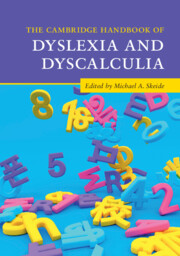Book contents
- The Cambridge Handbook of Dyslexia and Dyscalculia
- The Cambridge Handbook of Dyslexia and Dyscalculia
- Copyright page
- Contents
- Figures and Tables
- Contributors
- Acknowledgements
- General Introduction
- Part I Theoretical Frameworks and Computational Models
- 1 Theories of Dyslexia
- 2 Theories of Dyscalculia
- 3 Computational Models of Reading and Mathematical Difficulties
- Summary: Theoretical Frameworks and Computational Models
- Part II Cognitive Profiles and Behavioural Manifestations
- Part III Genetic and Environmental Influences
- Part IV Neurodevelopmental Foundations
- Part V Gender, Ethnicity, and Socioeconomic Background
- Part VI Cultural Unity and Diversity
- Part VII Early Prediction
- Part VIII Intervention and Compensation
- Part IX Best Practice – Diagnostics and Prevention
- Part X Best Practice – Schooling and Educational Policy
- General Summary
- References
- Index
- References
3 - Computational Models of Reading and Mathematical Difficulties
from Part I - Theoretical Frameworks and Computational Models
Published online by Cambridge University Press: 28 July 2022
- The Cambridge Handbook of Dyslexia and Dyscalculia
- The Cambridge Handbook of Dyslexia and Dyscalculia
- Copyright page
- Contents
- Figures and Tables
- Contributors
- Acknowledgements
- General Introduction
- Part I Theoretical Frameworks and Computational Models
- 1 Theories of Dyslexia
- 2 Theories of Dyscalculia
- 3 Computational Models of Reading and Mathematical Difficulties
- Summary: Theoretical Frameworks and Computational Models
- Part II Cognitive Profiles and Behavioural Manifestations
- Part III Genetic and Environmental Influences
- Part IV Neurodevelopmental Foundations
- Part V Gender, Ethnicity, and Socioeconomic Background
- Part VI Cultural Unity and Diversity
- Part VII Early Prediction
- Part VIII Intervention and Compensation
- Part IX Best Practice – Diagnostics and Prevention
- Part X Best Practice – Schooling and Educational Policy
- General Summary
- References
- Index
- References
Summary
Computational modelling is a powerful tool in cognitive science to evaluate or compare existing theories and to make novel experimental predictions. In contrast to the vague formulation of traditional verbal theories (e.g., box-and-arrow models), computational models need to be formally explicit in any implementational detail and can produce accurate simulations of human performance. Computational modelling has many different flavours that reflect distinct theoretical approaches to understanding human cognition (see McClelland 2009, for a review).
Information
- Type
- Chapter
- Information
- The Cambridge Handbook of Dyslexia and Dyscalculia , pp. 45 - 60Publisher: Cambridge University PressPrint publication year: 2022
References
Suggestions for Further Reading
Accessibility standard: Unknown
Why this information is here
This section outlines the accessibility features of this content - including support for screen readers, full keyboard navigation and high-contrast display options. This may not be relevant for you.Accessibility Information
- 1
- Cited by
